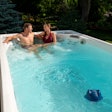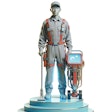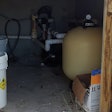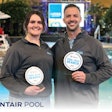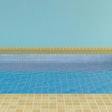
It's not déjà vu, but it does seem like we've been here before. Fresh from an industry-shaking experience with VGB, another government mandate has arrived which will force public pool operators to spend money on pool equipment/alterations they hadn't planned for. This one's called ADA.
It somehow seems a little easier this time. The ADA directives seem more straightforward, and as an industry we know more or less what the steps are. The government will make its demands known, there will likely be follow-up decisions regarding certain points, and then some sort of (as yet unclear) enforcement threat.
The Americans with Disabilities Act was actually passed under the first Bush administration and then expanded to the pool and spa industry under the second. Still, nothing much happened until the Act was officially clarified last year to spell out what is to be required of public pools and by when — March 15, 2012, to be exact.
The Act does NOT affect residential pools and spas, but only public pools, both new and existing. Typical pools affected include YMCA and community pools, and also hotel pools and spas. As of the writing of this article apartment and condominium pools are not included, but as became clear during the industry's experience with VGB, new rulings to resolve issues of fine detail can crop up at any time.
For instance, a private apartment pool may be used for a swim meet, making it public. How many competitive swimmers make a meet? These points could be decided at some future date, or not at all.
The actual steps a "public" pool must take to comply are refreshingly simple and straightforward, especially after VGB's brow-furrowing terminology and its lawyeristic definitions of words like "blockable" and "unblockable." Under ADA, larger pools (greater than 300 linear feet of pool wall) require at least two means of access. Smaller pools (less than 300 linear feet of pool wall) require at least one.
Either a pool lift or sloped entry (ramp) must be the primary means of access. Where a second means of access is required, it may also consist of a transfer wall, transfer system, or stairs. More-detailed information is available at the APSP website.
All Quiet On The Front Line
As might be expected, with a deadline that stretches all the way into next year, nobody is breaking down the doors of service companies to get lifts installed or transfer walls built.
"So far, my customers are looking at it, but they haven't really made any decisions on what they're going to do," says Leland Stith, Blue Fish Pool Maintenance in Vacaville, Calif. "It's kind of like it was with the VGB deal where they all said, 'We don't have to do it today, so we're not going to do it today.'"
That sums it up for Gary Tripp as well. He's the owner of Tripp Construction, Raymore, Mo., a builder with a significant service dept. He hasn't seen much of a response so far, either.
"I've been talking to my customers personally, just telling them what they're going to have to do, and most of them say, 'Well, we're going to see what the final result is going to be before we do anything.'
"They know they have another year left, and they know that VGB changed during the process, and I think they're hoping that something might change with ADA.
"I don't know what that could be," he adds, "I mean, either you've got to have a chair lift or you don't. But they're reluctant because so many of them felt they got burned on VGB — they had to hurry up and spend all this money and nobody came around to enforce it."
Yes . . . enforcement, that is the rub. During the VGB era we learned that enforcement drives compliance. Nobody can say for sure at this point what form enforcement will take in different areas. Could be local building or health officials. Could take the form, as it does with other types of ADA noncompliance, of a civil lawsuit.
It could be enforced through local governments in the time-honored tradition of withholding federal cooperation in terms of grants or certifications. In these very common situations, before a local government entity can receive a federal grant for education or road-building or some other purpose, it must provide proof of compliance with a wide array of federal government mandates. Pool and spa ADA compliance would be included in these.
Or, as Joshua Zech, co-owner of Yorktown Pools, York, Pa., suggests, insurance companies may require it as a precondition of coverage to avoid large settlements from lawsuits.
No matter what form enforcement takes, he says, "I think that when the penalty for noncompliance becomes clearer, that will get things moving."
All In A Rush
Of course Zech is right, the serious action will begin when the pool operators who sign the checks say so, and that depends on their perception. Some are still completely unaware, he says. "I was just talking to some of the people that will have to comply with the ADA guidelines, and they were telling me they'd just come back from a trade conference and there had been no mention of it, which surprised me.
"But some of the places just got done with VGB, and they just haven't budgeted for a $5,000 lift or a $20,000 renovation."
That's a common sentiment, Tripp adds, noting that a second mandate following hard on the heels of VGB strikes customers as a little bit fishy.
"Coming right after VGB, where they just had to spend a lot of money," he says, "it seems to a lot of my customers that we're just after their pocketbook.
"I just say, 'Look, all I'm doing is telling you about this.' And I tell them I think ADA is going to be worse in some ways because it's an opportunity for attorneys to make money suing places without access equipment, and every lawyer in the neighborhood is going to want to get in on that."
In the end, these customers will all come around, Stith says. "They'll wait until the last minute to get it done. They've got all the time in the world to do it now, but they'll wait until they absolutely have to do it. And it'll all come in a rush."
Comments or thoughts on this article? Please e-mail [email protected].



























